Travel agencies in Jordan suspend employees despite Defense Order
Published: 2022-01-18 15:55
Last Updated: 2024-04-16 06:48
Editor: Aysheh Alghabin
One year into the outbreak of the pandemic, and after seven months of unemployment, Mohammad*, his wife and three children were forced to leave their home of 15 years after going through all their savings. With the collapse of the tourism sector, Mohammad found himself on the street along with 140 thousand workers in that sector, as the country’s tourism revenues fell almost 75%, from JD 4.1 billion (USD 5.7 billion) in 2019, to JD 1 billion (USD 1.4 billion) the following year.
When the crisis hit, 40 years old Mohammad was looking forward to his promotion working at a travel agency in Amman. He received a BA degree in Languages from Yarmouk University in 2005 and was fluent in French, Italian, and English, which enabled him to rise to the position of Logistics and Operations Manager, with a monthly salary reaching JD 1000 (USD 1400) from his initial starting salary of JD 300 (USD 420).
Turning Point
In mid-June of 2020, Mohammad’s employers decided to terminate the services of 13 employees, including Mohammad. This was a result of suspending the agency’s operations in the Ministry of Labor, after facing financial difficulties because of its inability to collect its due debts from clients who had to shut down their operations for two months in response to the Defense Order during the spring of 2020, which is the industry’s peak season. The employees were given a severance pay of two months and were left to face life on their own.
Mohammad says that he was “manipulated” into resigning. On the other hand, his colleague of 12 years, Omar*, says that his resignation was a result of the “mutual trust” between him and his employers.
A similar fate awaited Yazan* who worked also for a travel agency on an open contract before the agency addressed the Ministry of Labor requesting to suspend its operations and terminate the contracts of around 25 employees in response to the issued Defense Order.
Circumvention Using the Law
Later, Yazan and his colleagues found out that their agency was still operating, and filed a complaint with the Ministry of Labor. The ministry sent an inspection team that found that the working employees were “collection” workers employed on “temporary” basis according to the agency’s owners. Hence, the complaint was closed in addition to other similar grievances.
Between March 2020, and July, 2021, requests for the suspension of operations were submitted by 136 tourism establishments, 89 of which resumed operating in light of the partial re-opening of the sector, while 47 establishments remained shut down.
Illegal Exceptions in Operation Suspension
If a company wishes to continue suspending its activities, it is required to submit an electronic form on the Ministry of Labor’s website to be renewed every two months.
As a result of these mass layoffs, the Ministry of Labor received 10,452 complaints from workers in the tourism industry between June 2020 and June 2021, of which 4913 were submitted by workers in restaurants, transport and hotels.
Complaints submitted to the Ministry of Labor by workers in the tourism sector:
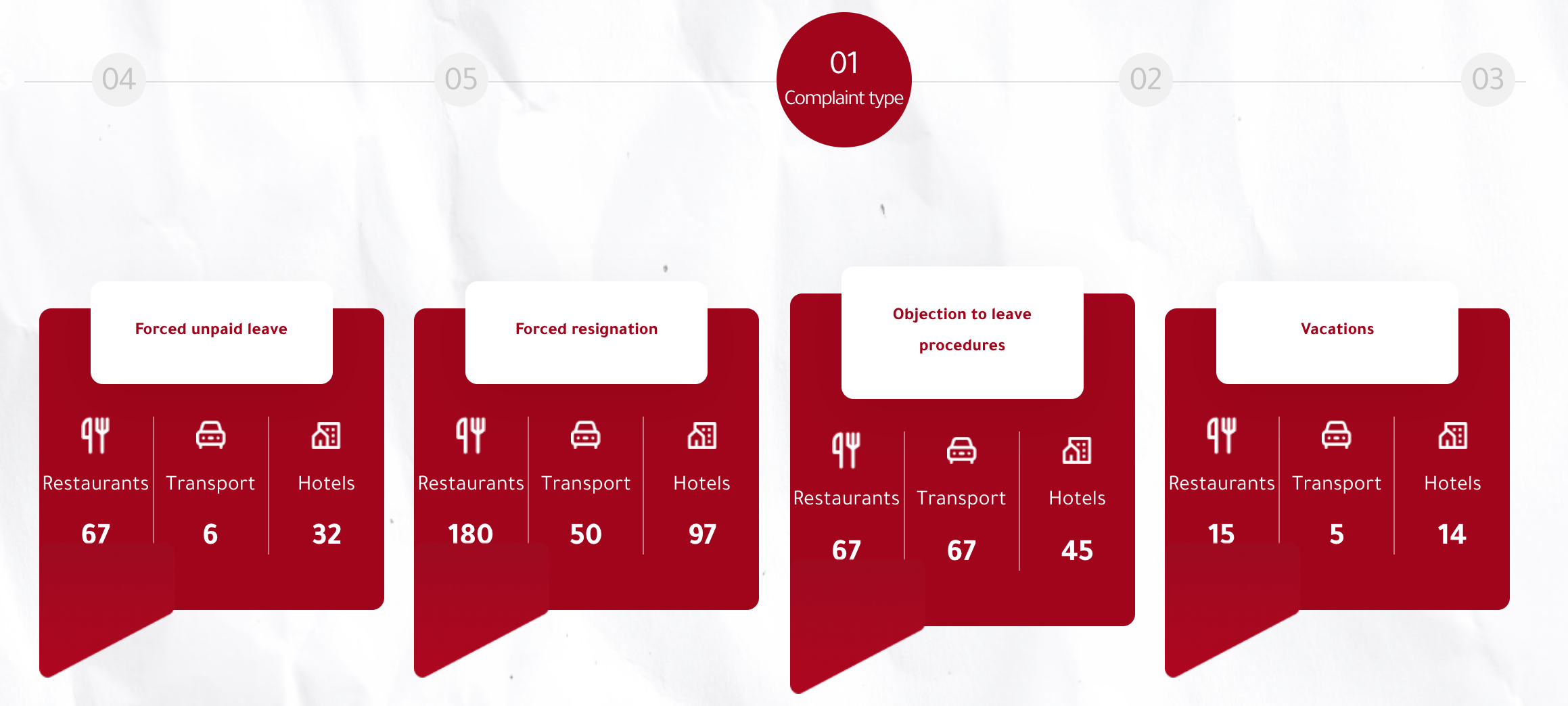
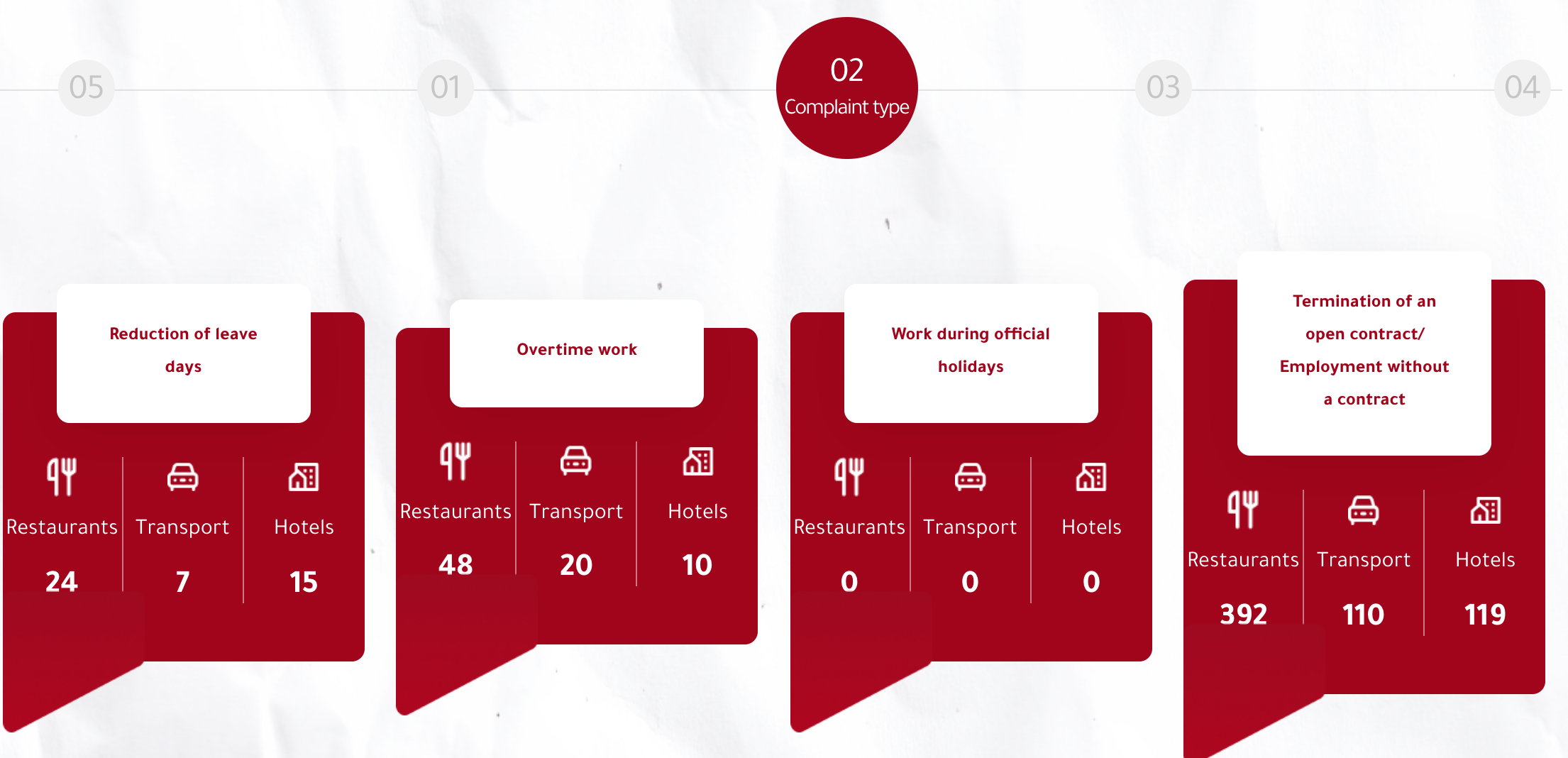
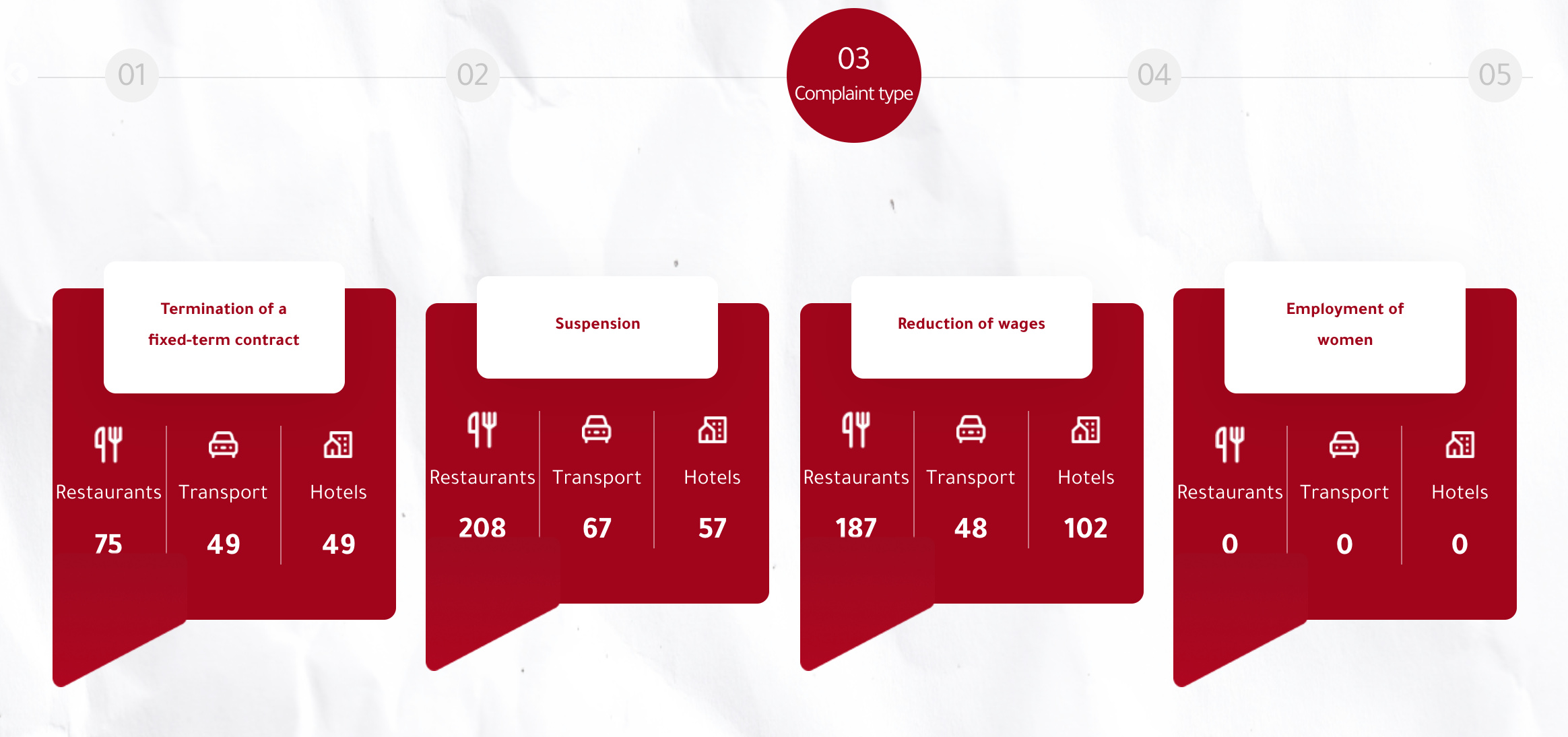
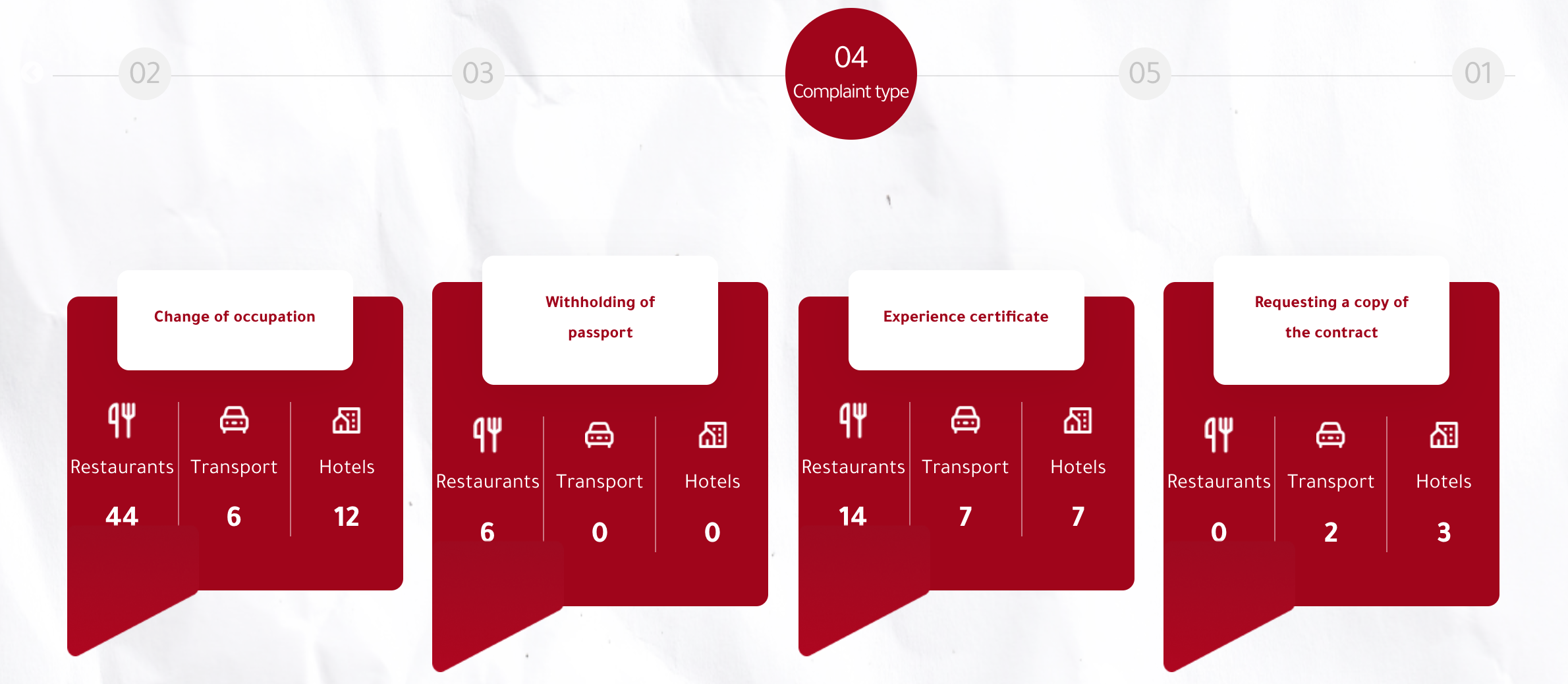
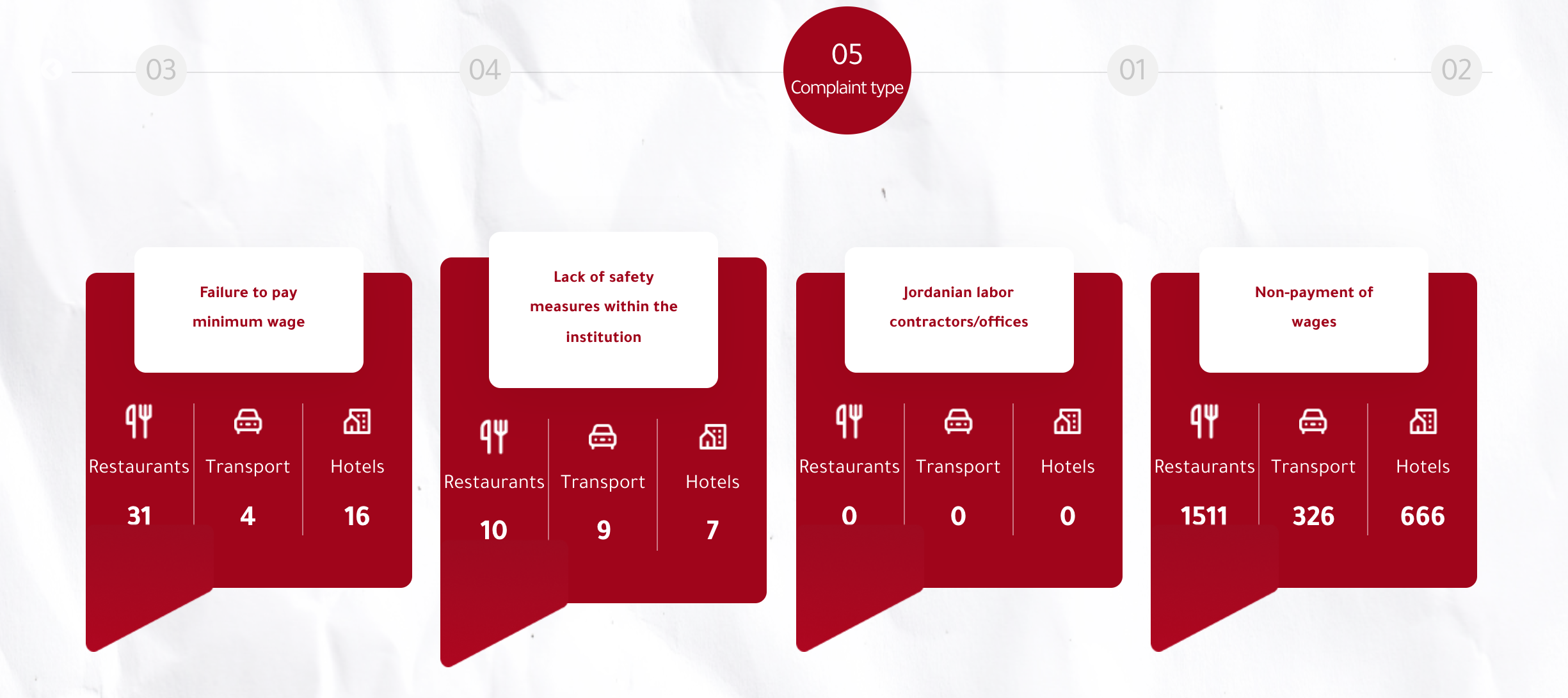
The tourism sector contributes 13% to Jordan’s GDP, with an annual income that reached JD 4.1 billion (USD 5.78 billion) in 2019. It directly employs 53 thousand workers in addition to 11 supporting sectors such as hotels, restaurants, transport, and souvenir shops.
Illegal Exceptions
We interviewed 20 workers in three tourism companies and found that the termination of services did not include heads of departments and workers in the accounting and collections section.
Labor advocate Muath Al-Momani argues that “the provisions of the Defense Order do not stipulate such exceptions, as terminations should include all employees and any practice otherwise is considered illegal,” adding that “Defense Orders should clearly state the regulations and procedures pertaining to a company’s request to suspend its operations, and add exceptions that would enable them to collect outstanding debts from various parties and carryout any needed settlements.”
Government institutions have not indicated any procedural exceptions in the Defense Order to suspending operations. This has led companies to continue activities in their accounting and collections departments, violating the Defense Order that stipulates the complete suspension of all operations.
Overlapping and Unclear Mandates
The Director of the Media Response Unit at the National Centre for Security and Crisis Management, Ahmad Al-Nuaimat, stated that the executive authority responsible for issuing Defense Orders is the Prime Minister in his capacity as described in the constitution.” On the other hand, the Media Research and Studies Unit in the Cabinet Office referred our inquiries to the Ministry of Labor which is authorized to make statements regarding Defense Order issues pertaining to labor contracts
The National Centre for Security and Crisis Management was established to streamline the efforts of concerned national institutions, in order to professionally and effectively prepare and respond to natural and human-made national crises with minimum effort, time, cost and losses. In took effect in April 2015.
The Ministry of Labor responded by saying that the bank accounts of institutions which receive an approval to suspend operations are subjected to a precautionary freeze prohibiting the companies from making any withdrawals or carrying out business transactions during the suspension period. The ministry did not indicate the number of Defense Order violations it registered, nor did it comment on the fact that these orders lacked stipulations regarding exceptions in financial management. Hence, according to Al- Momani, this “error in the Defense Orders” is what allowed these violations to take place.
To explain the difference between the permanent and temporary suspension of operations, Al Momani states that in the former, the relationship between an employee and employer ends completely, while in the latter (temporary), the relationship continues and is subject to the provisions of article 5 of Defence Order No. 6 that stipulates that an employer is not obliged to pay employees a full salary during the suspension of operations period. It also stipulates that institutions are entitled to submit an application to a joint committee formed by the Minister of Industry, Trade and Supply and the Minister of Labor requesting a temporary suspension of all its activities and employee contracts. Institutions cannot take any action until they receive approval from this committee. The government refuses to comment on Al-Momani’s statement or answer any inquiries, indicating that the execution of Defence Orders is mandated to the Ministry of Labor and the Centre for Crisis Management.
The Ministry of Labor, on the other hand, states that this issue has been referred to the Social Security Corporation to which workers should be referred to in order to receive compensation for the suspension of their employers’ activities.
In the spring of 2020, the Social Security Corporation SSC launched the sustainability program “Estidama”, estimated at JD 15.657 million, benefiting 849 companies and 17246 workers.
The SSC also launched a program to support workers in the tourism sector. Through this program, workers are paid 50% of their salaries, with a maximum of JD 400 and a minimum of JD 200, provided that their companies cover 1/5 of any contingency payments. The program cost the SSC JD 3.8 million, benefitting 256 tourism companies and 5732 workers. Spokesperson for the SSC Shaman Al- Majali stated that these funds were not grants to these institutions, but they consist of loans with an interest rate of 3% to be covered by the government.
Dana*, aged 33, worked in the tourism sector from 2007 until the end of 2020, when she was forcefully laid off. Four months prior to the pandemic, Dana signed an open contract as a business development consultant with a monthly salary of JD 1500. However, at the beginning of the pandemic, the company she used to work for, forced its 20 employees to sign new fixed-term contracts until the end of 2020. Such a procedure violates the Defense Order according to advocate Muath Al-Momani. The company has also failed to pay its employees their salaries as stipulated by the Defense Laws for the months of March and April, due to insufficient funds.
Commenting on the cases of the arbitrary termination of contracts mentioned in this report, Al-Momani states that “any other action taken is unlawful and is considered a violation of the Defense Orders and communiques. Article 4 of Communique No. 7 under Defence Order No. 6 stipulates that “In accordance with this communique and as long as the Defense Law remains in use, a Jordanian worker’s fixed-term contract is renewed automatically unless an agreement for its extension has been reached.
Article 4:
In accordance with this communique and as long as the Defense Law remains in use, a Jordanian worker’s fixed-term contract is renewed automatically unless an agreement for its extension has been reached, provided that:
1-The contract had ended on April 30th, 2020 or later.
2-The contract had been previously renewed three times or more.
Saleem*, the owner of a travel agency, says that in August of 2020, he was forced to shut down after reaching an agreement with his employees to submit their resignations, with the hope that they would return to work after circumstances improve. Saleem says that the lack of support from the government in addition to its capricious decisions caused confusion among agency owners and drove them towards shutting down.
He did not submit an application for suspension to the Ministry of Labor and found it sufficient to explain the situation to his eight employees who agreed to submit their resignations adding: “my employees were more cooperative than the government. They understood the dire situation and readily submitted their resignations.”
As a result of the pandemic, 307 out of 800 travel agencies failed to renew their licences until April 2021. About ten thousand workers were employed by these travel agencies located across the country’s twelve governorates
“Little is better than abundance that does not last” Holy Hadith
Mohammad and his colleagues asked their agency owners to reinstate their employment and social security enrolment to enable them to benefit from its protection plan, even agreeing to a reduction in wages. Mohammad quotes the Hadith: “Little is better than abundance that does not last.”
Communique No. 18 under Defense Order No. 6 regarding the regulation of wages in the private sector ordered the payment of 75% of a worker’s monthly salary for the period between December, 2020 and May, 2021, in sectors mostly affected by the pandemic, including the wages of upper management
Elusive Loans and Selective Programs
Jamal Al-Damen, Vice President of Jordan’s Society of Tourism and Travel Agents complains of “the Ministry of Tourism’s lack of support for travel agencies,” adding that “the only measure it took was an announcement issued by its former minister, Majd Shwaikeh, regarding a funding of JD 30 million through exempting travel agencies and tourism business owners from paying licence renewal fees last year.” Al-Damen states that this decision was not implemented, and that travel agencies that shut down and lost all forms of income during the past year and a half, still pay around JD 500 in annual licence renewal fees, JD 350 for the Society of Tourism and Travel Agents’ membership, in addition to an average of JD 6000 (USD 8462) monthly in salaries and operational costs.
Al-Damen admits that some travel agencies benefited from loans offered by the Central Bank of Jordan with fixed interest rates throughout the period of financing. Yet most small and medium sized agencies were unable to take advantage of these loans due to the uncertainty associated with the pandemic and the future of the tourism sector, in addition to the lack of a specific point in the future where businesses can resume normal operations and pay off any outstanding debts or loans.
Central Bank of Jordan (CBJ) Programs
4/3/2020 Launch of a JD 500 Million Soft Financing Program for Small and Medium Sized Enterprises
- Fixed interest rate
-Low financing fee not exceeding 2%
-High guarantee level reaching 85% and a 6 month grace period
-Targeted sectors include:
Tourism services excluding hotels JD 250 thousand
Hotels JD 1 million
Transport JD 1 million
14/4/2020 Launch of a JD 1.2 Million Economic Sectors Support Program
-Provide low-cost financing for the investment and operational costs of various economic sectors to raise their competitiveness and production capacity with easier terms and conditions
-Targeted sectors:
Tourism JD 3 million
Transport JD 4 million
3/11/2021 CBJ increases support for small and medium sized enterprises to JD 700 million and extends terms of loans granted to sectors affected by the pandemic without late fees for one year
3/11/2021 CBJ increases ceiling of loans for tourism sector to JD 4 million up from JD 3 million with a total value of JD 1.2 million
Yazan was unable to benefit from the unemployment program until May of 2020, because of insufficient funds in his enrolment account with the Social Security Corporation. He received a payment of JD 350 in May, but did not receive any other payments until the launch of the “Musaned -1” (meaning support) program in the beginning of 2021. Up until the publishing of this report, Yazan had received six payments starting from March as follows: JD 500 the first two months, then JD 350 for four consecutive months.
Dana has been receiving job offers from travel agencies but for salaries that would barely cover her transportation costs in light of the difficult commutes and traffic jams in Amman besides the lack of public transportation where she lives.
Mohammad has returned to his hometown of Irbid and resides close to his family. After spending 10 years working hard to succeed and raise the profits of the travel agency he worked for, he now works as a driver through smart applications to provide for the basic needs of his family and children.
Today he cannot help but wonder: Had he misplaced his trust? Had the government failed to monitor and control the violations? Was it the fault of the Society of Travel Agencies for not passing on their grievances or standing up for them? Or was it an unforeseen crisis that have hit everyone and has changed the rules of the game?
*Names have been changed to protect employee identity

